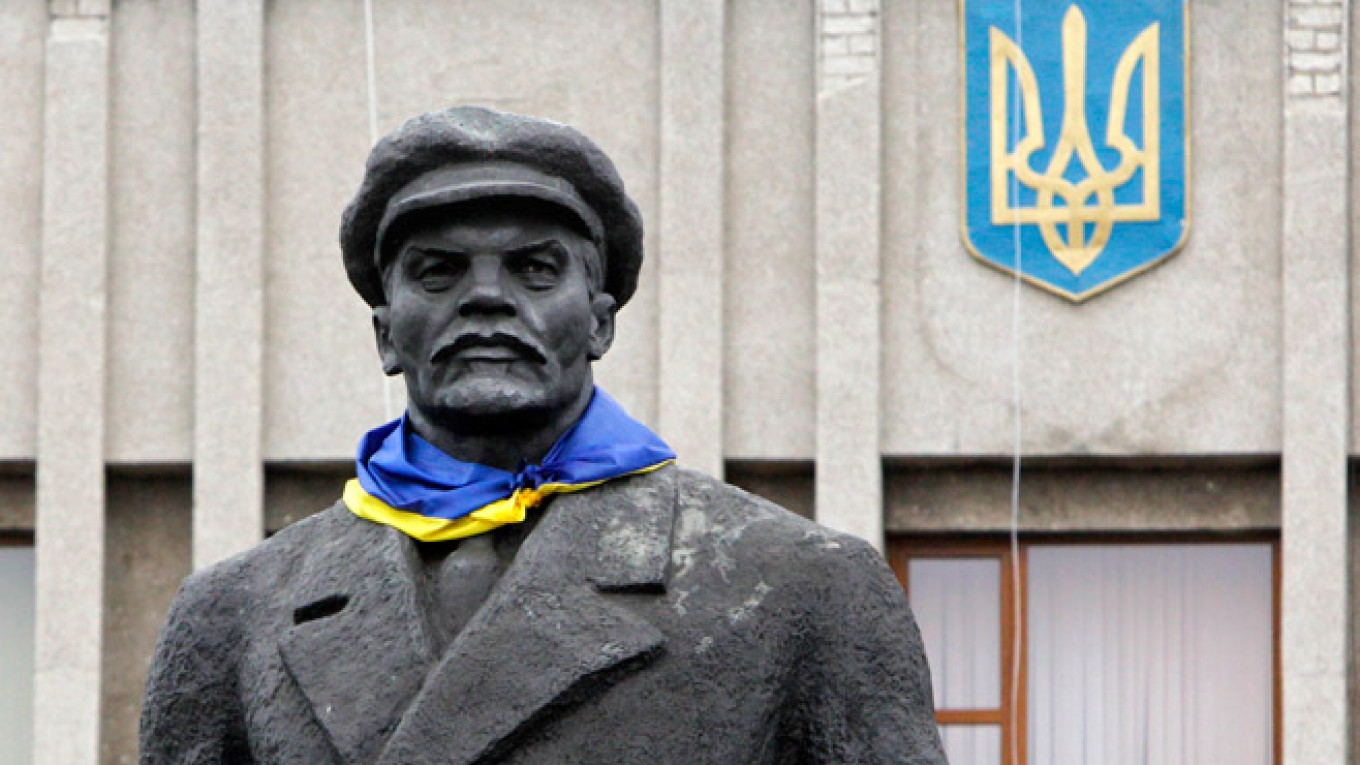The Kremlin says President Vladimir Putin will meet with his Ukrainian counterpart at an Aug. 26 meeting in Minsk, Belarus.
The Kremlin said Tuesday that Putin would meet with the Ukrainian president, as well as officials from the European Commission and the Eurasian Customs Union, which is comprised of Russia, Kazakhstan and Belarus.
Ukrainian President Petro Poroshenko, who confirmed the news in a statement, said that "stabilizing the situation" in eastern Ukraine would be a key topic of discussion.
Putin and Poroshenko have not met since early June.
Meanwhile, battles continue to rage in the background, with the death toll in fighting between pro-Russian rebels and Kiev's forces in eastern Ukraine having claimed more than 2,000 lives.
Ukrainian government troops were fighting pro-Russian rebels in the streets of Luhansk on Tuesday and captured most of a town near the eastern city of Donetsk, tightening the noose around that key rebel stronghold, Ukrainian officials said.
One soldier was killed and four wounded when a volunteer battalion came under mortar fire before entering the town of Ilovaysk, 18 kilometers east of Donetsk, Interior Minister Arsen Avakov said in a Facebook post.
Among the wounded was the commander of the Donbass battalion, Semyon Semenchenko, who said that government soldiers had destroyed three rebel checkpoints and four firing positions, and that fighting continues.
Government efforts to quell the separatists have focused on encircling Donetsk, the largest rebel-controlled city in eastern Ukraine.
Ukrainian troops were also advancing in the neighboring separatist region of Luhansk, capturing one neighborhood in the city of Luhansk as they battled the rebels Tuesday on city streets, Colonel Andriy Lysenko, a spokesman for Ukraine's National Security Council, told reporters.
Fighting between government troops and pro-Russian separatists in eastern Ukraine has forced nearly 344,000 people to flee their homes, according to the United Nations — a number that has only grown as the humanitarian situation in rebel-held cities deteriorates.
The situation appears to be particularly dire in Luhansk, near the Russian border, which has been left without electricity, running water or phone connections for 17 days.
The Luhansk city hall said the city's downtown came under fierce shelling overnight, killing or wounding an unspecified number of civilians. Residents are standing in lines to buy bread as food supplies are running out, the city hall said. Authorities also raised the alarm about a potential outbreak of infectious diseases since household garbage has not been taken away for more than two weeks in the sweltering heat.
The Ukrainian government, meanwhile, has accused the rebels of killing dozens of civilians in a shelling attack Monday on a convoy of refugees fleeing Luhansk. The rebels denied that any attack took place, while the U.S. confirmed the shelling of the convoy but said it did not know who was responsible.
There have been no eyewitness accounts of what happened and the war-torn area is largely off limits for journalists, making independent verification impossible.
The Ukrainian Defense Ministry released a video Tuesday showing people who appeared to be survivors of that attack and who were taken to the nearby village of Novosvitlovka. The video also showed a young man lying on a hospital bed sobbing. A woman who was not pictured said his mother was killed in the attack.
Journalists still have not seen any videos or photos of the scene of Monday's shelling attack on the road from Luhansk to Russia.
Ukraine and the West have also voiced concerns about Russia's military activity at the Ukrainian border. Moscow has said it can do what it wants within its borders but invited a mission from the Organization for Security and Cooperation in Europe to observe two border crossings in a bid to counter claims that the Kremlin is supplying the rebels with weapons.
Paul Picard, head of that mission, told reporters in a Russian border town on Tuesday that observers had seen a marked increase of military activity around the border points over the past week, including Russian helicopter activity. But he said no helicopters were observed crossing the border.
Picard also said the observers had seen "groups of young men and women wearing military-style dress" moving back and forth across the border. No weapons or military vehicles were observed.
Tensions have been high over the past week since Russia said it plans to send a massive aid convoy to help people in eastern Ukraine. The International Committee of the Red Cross, which is expected to take responsibility for the convoy when it enters Ukraine, was still waiting for security guarantees from all sides Tuesday.
The Russian Foreign Ministry said its head, Sergei Lavrov, and ICRC President Peter Maurer agreed to take steps "in the next several hours" to clear the way for the convoy to proceed to Ukraine.
See also:
A Message from The Moscow Times:
Dear readers,
We are facing unprecedented challenges. Russia's Prosecutor General's Office has designated The Moscow Times as an "undesirable" organization, criminalizing our work and putting our staff at risk of prosecution. This follows our earlier unjust labeling as a "foreign agent."
These actions are direct attempts to silence independent journalism in Russia. The authorities claim our work "discredits the decisions of the Russian leadership." We see things differently: we strive to provide accurate, unbiased reporting on Russia.
We, the journalists of The Moscow Times, refuse to be silenced. But to continue our work, we need your help.
Your support, no matter how small, makes a world of difference. If you can, please support us monthly starting from just $2. It's quick to set up, and every contribution makes a significant impact.
By supporting The Moscow Times, you're defending open, independent journalism in the face of repression. Thank you for standing with us.
Remind me later.






